Are You Ready?
Along with many of you, the people of Japan have been on my mind and in my prayers.
I've been thinking about the unimaginable things that people there are facing right now. I've watched the videos; I've seen the before and after images; I've listened to the stories that move me to tears. There really are no words.
I've been thinking about how much I loved Japan the two times I visited - once in high school with my Dad and once for a scrapbooking event a few years back. It's one of my favorite places I've traveled to and I hope to visit again.
I've also been thinking about our own disaster readiness (or lack of readiness) here at home. What we would do, in our own family, if there was an earthquake? We're not in a tsunami danger zone here (we're an hour from the coast), but we're definitely in an area they say is simply waiting for the "Big One."
I decided we need to take action. We need a family disaster kit/plan/etc. We've got a few things in our garage, but definitely not enough, and we don't have a plan.
I'm starting with the Red Cross website. I downloaded the Be Red Cross Ready (PDF) and will be getting together our plan and kits over the next couple of weeks. Here's another site to check out: www.72hours.org.
Many of you live in areas of the country and world that face natural disasters more frequently. Regardless of where you live, do you have a disaster plan in place? Do you have supplies on hand? Do your kids know what to do?
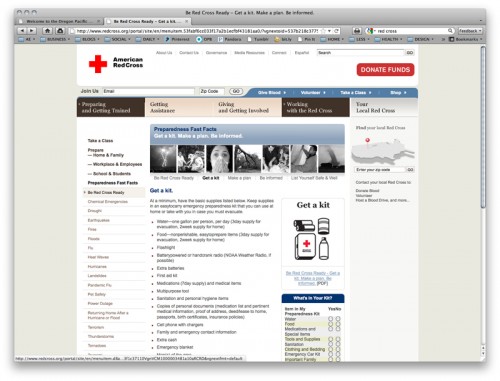

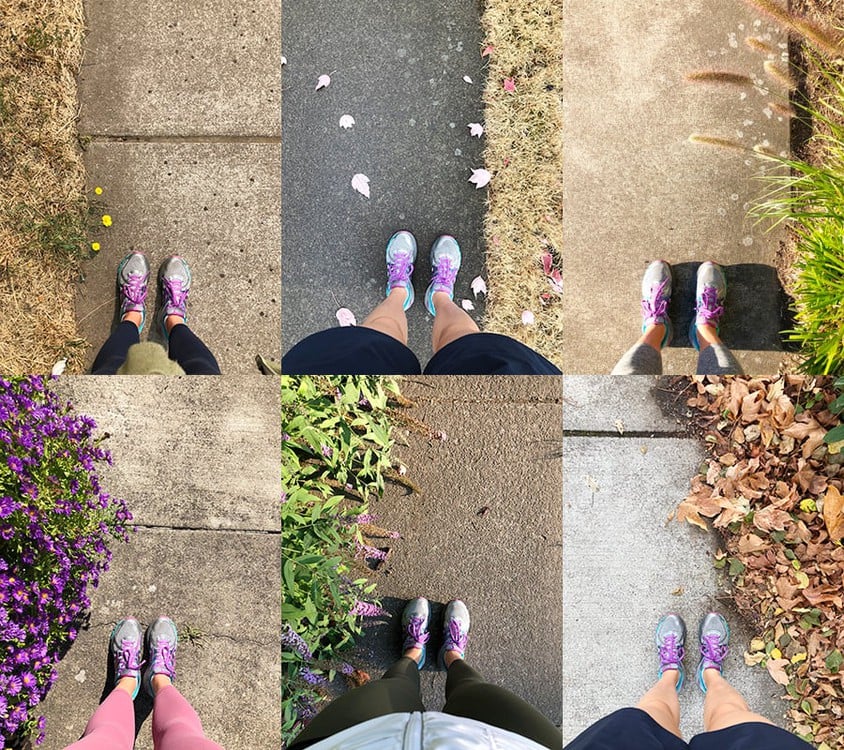
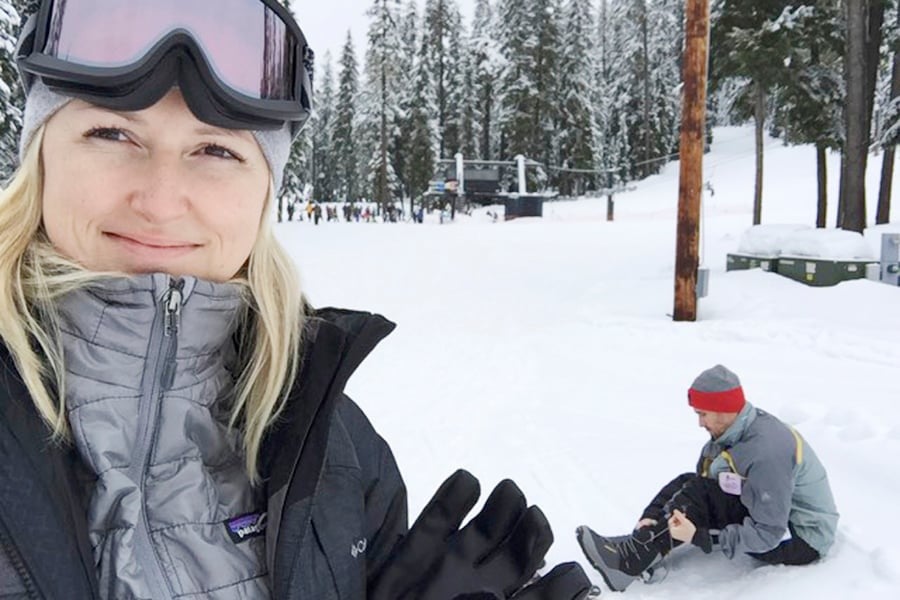
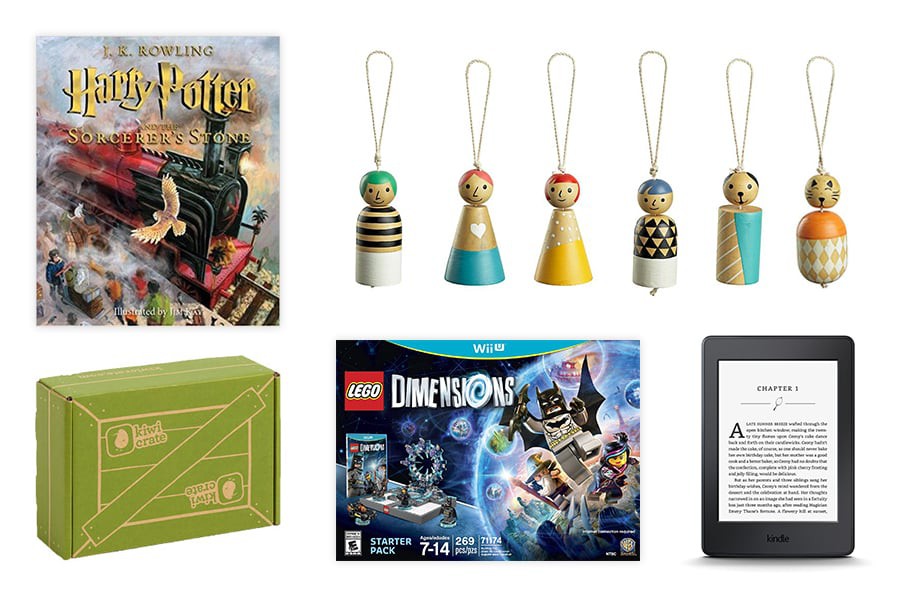
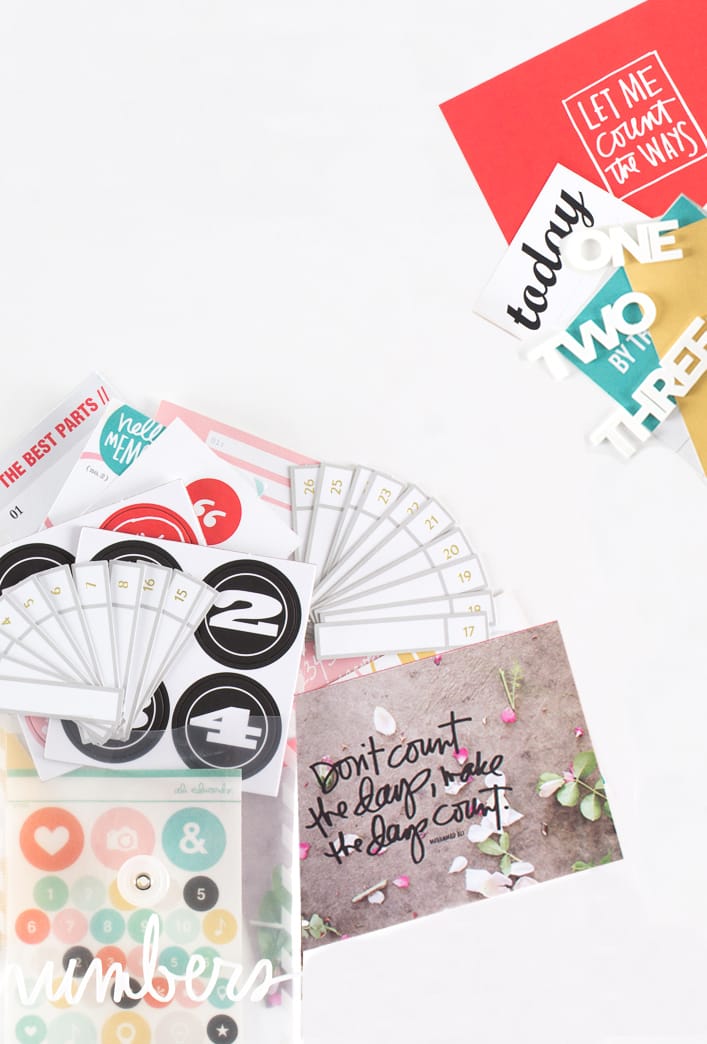






Living in Christchurch this is what I think needs to be added to the list from my experience.
- Eye Wash - for post building collapses and during dust storms of silt.
- Walking/running shoes and a jacket in the car at all times. High heeled shoes are not useful when you suddenly find you have to walk home as the roads cannot be driven on (this does of course mean that you need to be able to access your car and so having these at work might be a good alternative)
- A decent first aid kit for the car - you just don't know when you might need it.
- Hand Sanitiser a must.
- Information on how to create an emergency toilet or some thought on what you will use for this.
- Wind up radio/torch - I gave these as Christmas presents last year and the one I gave also charge cell phones and ipods.
- A longer list of people who can collect your children from school - who knows where the emergency pick up people will be at the time of the quake, so have secondary pick up people could help.
- Making sure the floor is clear at night from bed to doors and that you know where the keys to the house are during the night especially if your doors are key locked at night.
- The out of area emergency contact information is a great idea as we seemed to be able to contact out of ChCh places but not in ChCh on phones. I would add to this making sure they have a list of all the important people and their contact details as well, as when I talked to my out of town person I needed them to try and get a message back to my inlaws to pick up the children.
- Pens, pencils and paper... at least you can play noughts and crosses and a pack of cards.
- non scented bleach to purify water.
- our school is now asking for blankets so that they have some for putting around students. I also have to say the teachers did a marvellous job with the kids especially as they cannot leave until the kids are collected which means they can't get to their own kids.
- I also agree with the map idea on the 72hrs website. One comment made on NZ TV about the Japan quake is that people were so used to being on public transport they didn't know how to get home when they had to walk.
Hopefully this might help someone else.
Sign in or sign up to comment.
Hi Ali
Thank you for talking about Japan and the terrible situation. It is top of mind for anyone with awareness outside their own immediate circle. I live in Christchurch, NZ, where we have had two very severe earthquakes in the last 6 months. I could talk for hours about my experiences and how to get through this type of situation. I will email you separately and you can share any part of that email, but here I will just post a few things.
A kit is imperative. And you really need to think about where you put the kit - it's no use in a garage if the door is electrically operated as power will no doubt be off in the emergency situation. It's also no use in a room which might have access blocked by fallen shelves etc (eg behind my laundry door there is a shelf of preserves and in the last quake these all came off the shelf and smashed behind the door, meaning access was slow and tricky to achieve). I have taken to having a basic kit in my car trunk and then two further kits in different parts of the house and outbuildings.
Think hard about the amount of water your family will consume. You will need double what you expect, if not more! At the moment we have to boil all water we consume (it took 10 days for water to come back on here), and I am now VERY aware that our three person family (plus cat) needs upwards of 20 litres per day, and that doesn't include hygiene use water. You can store this in clean empty juice bottles and just rotate the contents when you are not using it - ie don't leave it to get stagnant - use the water and refill every month or so to keep it fresh. I will never take potable tap water for granted again!
Make sure your car always has at least 1/2 tank of gas. I used to be the one who left it to the last drops before refilling, but luckily on the day of our quake I had a full tank, but I saw panicked people who had little gas in their tank and the added stress is just not worth it.
As well as your kit of life-supplies, you need to have a plan of getting the family together. You and Chris need to know who will get the kids from wherever they are, and where you will meet - have 1st, 2nd, 3rd options as your first option may not be possible. You also need to let Simon know what the plan would be as he may be at school and need to know (for his own emotional wellbeing as well as to tell teachers) who will be coming, that it may take time, but that they WILL come for him.
The other thing I have to say for getting through something like this, is you have to have a plan for the future. Resilience is not just about being stoic, and bouncing back, it's more important to be able to bounce forward, and having a goal (however small) is important in that.
Don't forget your pets in your planning - dog or cat food, and cat litter are important. We have a cat and his travel box is now very accessible in case we need to leave at short notice. We all also know the location of portable valuables (ie jewellery box), passports and documents, and the external hardrive. Going through this and having the chance of being evacuated from our house with 4 minutes warning has made me realise those are the material things I need to take - all else is replaceable and it amazes me now how I am emotionally unattached to my artwork, my books and all the other things I used to hold so dear. Yes, they are still important, but now they are not life-or-death important.
Do Simon and Anna know what to in a quake, or how to recognise a tsunami? Kiwi kids from age 3 learn to "turtle" (curl up and cover their heads) in a shake, getting under desks and holding on if they are inside, and NOT running out of the building. You need to hold on and move with the table because, believe me, even the heaviest of desks walks across a floor in a quake!! You can easily teach them these things in a fun learning way - my 9 year old daughter knew exactly what to do and was amazingly calm and collected through both our quakes. In the Boxing Day Asian tsunami (2004), one kiwi school child saved hundreds of lives by recognising the water at the beach was receding (tsunami indicator) and telling everyone to move off the beach. Kids take their cues from their parents, and they have huge resilience, and an ability to take on board the info we need them to know without having nightmares about it all.
That's a long post. I will email you in the next few days with my experiences which might help you or at least be interesting for you.
Great post, Ali.
Sign in or sign up to comment.
My family and I are doing the same thing. We are ordering the back packs for each of us (total 4) so that we don't miss a single basic thing. Then a family kit for all of us. So we are ready now. I have seen the back packs before during disaster training and believe me you can't possibly remember all the details that they have in this back pack. It is worth it because by the time you buy everything individually, you would have spent more. We are all praying for Japan in our home.
Sign in or sign up to comment.
Thanks for the reminder. I need to start scoping the ads/coupons and get our Hurrincane kit back in order. Lots of water, canned goods (we then eat them all up during non hurrincae season) and batteries. The rest is always ready to go in a large tote that we keep in the garage.
Sign in or sign up to comment.
Thanks Ali for this timely reminder. Here in the Puget Sound area we had a quake 10 years ago last month. Many of us dodged the bullet with that one. We may not be so lucky with the next earthquake. I need to get my family in gear and get prepared.
Sign in or sign up to comment.
Thanks Ali for such a vital reminder. In addition, your post was a wake-up call that I need to review with my family our "escape plan" in case of fire. Last but not least, as unlikely as a break in would be, I also find a soft approach to discuss with my kids that should anyone ever enter our home and tell them they must leave with them, instead they must scream to alert us. It's all for one and one for all.
Sign in or sign up to comment.
Here in central FL, we're always prepared for hurricane wether, which normally isn't too bad on us; however, if we EVER had a tsunami we might as well just give it up! We're very close to the Crystal River Nuclear Plant, not to mention there really isn't that much land between the Atlantic and Gulf coasts (about 60 miles either way). Roads are so congested now, can't imagine how we could all reach safety. All you can really do is live your life to the fullest and PRAY that it never happens here!! This isn't really meant as a gloom and doom response.......honestly!
Sign in or sign up to comment.
I echo everything that the other kiwi grils have said. With the recent spate of large earthquakes just up the road in Chch we now have our emergency kit ready and an action plan sorted as a family.
Sign in or sign up to comment.
Something I would recommend with the documents is 1. Make sure they are in a safe place - they are all of your personal details and you don't want just anyone getting them. 2. Laminate them or put them in a waterproof bag - no use having them only for them to be destroyed in rain/flood/tsunami waters. 3. Include any personal documents (licence, birth cert, passport, insurances, etc) but also a photocopy of any prescriptions for medications you take, as well as a printed list of emergency phone numbers/addresses - no use having them stored on your cell phone if the battery becomes flat and you can't use it.
We find that our camping supplies double a lot of the time for emergency equipment, so in the event of an emergency we could grab our camping containers. It's also wise to consider that you may not be able to drive to get out, so a backpack or grab bag may be needed too.
It's not the most pleasant topic to dwell on, but it is quite important - a bit like having a current will.
Sign in or sign up to comment.
Thanks for this reminder Ali. I am going to do this with my students this week!
Sign in or sign up to comment.
Hi Ali, we live in Auckland, New Zealand, and after the first earthquake for Christchurch in September 2010, I got a kit together and have a plan. Stranglely I am adding to it after having it for quite a few months now. And my mum had a good idea as I didn't want to remember to change the water reserves every so often, she said to freeze the bottles and then they stay fresh. Still plan and kit still wouldn't help out run a tsunami, just if you are lucky enough to survive it. We are just so lucky to be alive, happy and living on with our daily lives. Cheers,
Sign in or sign up to comment.
Ali, Thank you for writing about the earthquake in Japan. I live in Australia and Japan is my home country. Fortunately all my family members are the safe but, after the news, I couldn't do anything but just keep watching the Internet news everyday. I am the survivor of the big earthquake in Kobe Japan 1995. The memories of the disaster flash back in my mind and having difficulty of sleeping. I didn't want to do the scrapbook, I didn't want to do the "yesterday & today" 's class either.
but,After the reading your blog post, I get a little energy back. Thank you for thinking about Japan. Thank you for loving Japan. I wish you visit beautiful Japan again soon!
Sign in or sign up to comment.
Thanks so much Ali -- we've been preparing over the last few months (just been having a feeling). But, we are pretty low on medical supplies -- this is a great tip and link.
Also, Costco has some great food tubs (freeze dried -- but we live in a climate with a LOT of water, so that's all right). Easy to store and long-lasting -- with a week's worth of food for three (I think).
Keeping supplies in the car is a great bit of advice, too. We do this (especially, after being in the quake of '89 in CA) and it's come in handy.
Thanks again and be safe! =)
Sign in or sign up to comment.
On a smaller scale, 2 months ago we had a kitchen fire, but the smoke damage was so bad that our house is totally gutted. Thankfully it happened when we were gone, but it really made us think, and other people have told us too, it made them think about what if it happened when we were home. Did we have an escape plan? Our house has one way to get down from up stairs and we didn't have a fire ladder. We're not sure how we would have gotten out of the house--and what do we REALLY need to try to take with us, if anything?
Sign in or sign up to comment.
Our home was hit by a tornado last year (we live in NC) and we had to live in an apartment for 3 months while it was being repaired. Our son was 2 at the time and I was 8 months pregnant with our second son. By God's grace the storm hit early enough in the evening that we were all awake and were paying attention. We had about 30 seconds of warning to take cover in our closet under the stairs before all our windows exploded. It was very scary, but the scariest part is still thinking what COULD have happened! My son's room sustained the worst damage - a giant hole opened up in the roof and half the ceiling collapsed right on his bed.
I can't stress enough the importance of being prepared even when you live in what you think is a non-disaster prone area. Be sure to get a WEATHER RADIO that you keep on all the time and program to receive alerts about warnings in your area. Take pictures of each room in your house and document your valuables. Decide where your "safe place" will be and stock it with what you might need (like blankets and a flashlight). A little bit of effort can go a long way in the most critical of moments when disaster strikes without warning!
Sign in or sign up to comment.
My sister gave us a notebook for Christmas one year to put important info in and emergency cash. Our church has asked us for years to have food storage. Last year we put together small emergency backpacks for each family member. I just hosted a Shelf Reliance party that sells freezed dried food as well as other emergency supplies. I have had wheat, sugar, flour, noodles stored, but this company has vegetables, fruit, milk, and a larger variety of food down to brownie mix. The freezed dried stuff have shelf lifes of up to 20 years. Having food storage on hand has helped also in times of financial difficulty as well.
Sign in or sign up to comment.
You can get emergency food kits from Costco.com. They have them for all different diets, such as vegetarian and gluten-free. Just search "emergency kits" in the search engine. You also do not need a membership to shop Costco online.
Sign in or sign up to comment.
As a person who calls Christchurch her home town and happened to be in Tokyo when the big quake hit while we were visiting my husband's family I really ought to have a kit at the ready. We are currently living in Singapore which seems to be remarkably free of natural disasters. Having been down to my last diaper in Tokyo as they were completely sold out post quake (thank goodness for friends from out of the quake zone who brought some down with them for us) and struggling to find food for my one year old daughter in the days after the quake I am certainly going to be more organised with that side of things! It is a good reminder that we should not be complacent!
Sign in or sign up to comment.
Thanks Ali for the links and reminders to prepare for emergencies. My husband and I lived in Japan for two years while he was in the Navy and my heart goes out to the people there. They are very strong but this devastation will take many years to recover from. I live in the midwest so tornadoes and sometimes an earthquake are very possible here. I used to have a kit years ago but I need to start over and the links you gave were very helpful.
Sign in or sign up to comment.
I live not far from the christchurch earthquakes, a friend whose home was severally damaged in the earthquake offered me this advice - make sure your survival kit is readily accessible, maybe in a small shed outside, so that if your house comes crashing down you can still get to the survival kit
Sign in or sign up to comment.
Thanks for the ready.gov link. It's given me a lot to think about. And under the topic of scrapbooking...
As I look at my already large collection of scrapbooks and mini albums I started wondering which one would I take if I had to leave my home, but had time to gather a few important things. I have the last 10 years of photos saved digital in multiple hard drives that I can easily take w/me, but what about old pictures and all those painstakingly made layouts?
any thoughts?
Sign in or sign up to comment.